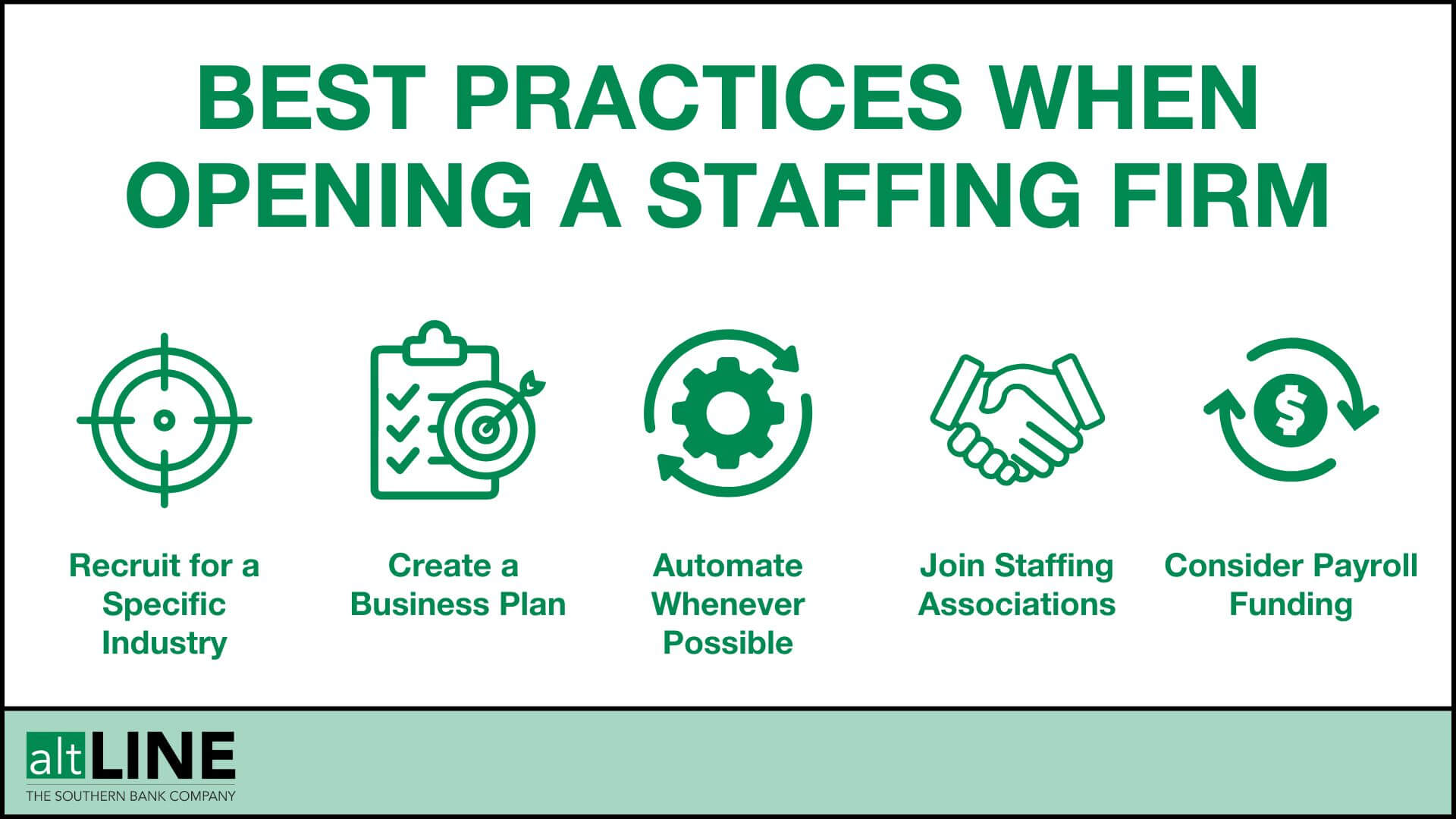Last Updated June 25, 2025
Running a staffing agency requires a keen eye for spotting talent. Effective staffing agencies bridge the gap between talented candidates and companies that need their skills, but plenty of agencies are vying for top candidates. You also need business acumen to run a strong, profitable business.
In this competitive environment, following staffing agency best practices will streamline your processes, improve the candidate experience, and ultimately lead to successful placements. Consult this guide for best practices on streamlining the recruitment process, as well as general tips on running a successful staffing agency.
Recruiting and Hiring Best Practices for Staffing Agencies
The more effectively you attract top talent, the more successful placements you’ll have. Follow these recruiting best practices to maintain a competitive edge in your market.
1. Have a DEI Recruiting Plan
More companies are looking for diverse candidates, and it’s no wonder why. Diverse companies are 35% more productive and earn 2.5X more cash flow per employee.
Diversity, equity, and inclusion (DEI) have to be more than just lip service. Every staffing agency needs a documented DEI recruiting plan outlining its strategy for attracting diverse talent. If you don’t have this already, work with your team to create an actionable DEI plan. Hold your team accountable for this plan with regular check-ins and audits. For extra transparency, consider sharing your DEI recruitment plan on your website.
2. Consider SEO When Posting Jobs
Search engine optimization (SEO) increases job listing visibility on search engines like Google. Use relevant keywords in your listings to rank higher in search results and attract more qualified candidates. Look at other job descriptions with a tool like Keywords Everywhere to come up with keyword ideas for your own listings.
3. Take Advantage of Social Media
Social media platforms like LinkedIn, X, and Instagram allow you to reach a broader candidate pool online. Some of our favorite best practices for using social media as a recruitment strategy include:
- Adding relevant job-searcher hashtags to each post
- Sharing real-life stories from successful job placements
- Checking the behavior of top candidates on social media
- Live streaming sessions answering common job seeker questions
4. Utilize Pre-Employment Assessments
Pre-employment assessments help you quickly filter candidates based on their skills and personalities. Assessments also help you make more objective decisions informed by data, allowing you to reduce turnover rates and improve the overall quality of your hires.
5. Don’t Overlook the Importance of Behavioral Interview Questions
Hypothetical or behavioral interview questions are best practices in recruiting. These questions help you see how candidates have handled situations in the past and give you a better understanding of their problem-solving skills. For example, instead of asking if someone is a team player, conduct a behavioral interview to assess whether their actions align with being a team player.
6. Conduct Background Checks
This is a fundamental recruiting and hiring best practice that verifies a candidate’s qualifications and ensures that they’re a person of integrity. Background checks offer your clients a seal of approval for each candidate, verifying their references, employment history, and criminal records. Even the most professional-appearing candidate needs a background check, so never skip this step.
7. Invest in Professional Development and Training
Currently, 87% of employers have skills gaps. While staffing agencies can only do so much to address skills issues, you can strengthen candidates’ chances of securing the job by encouraging them to pursue additional training or certifications. Review each candidate’s work history and resume to identify areas for improvement. Better yet, connect them with free or low-cost resources to improve their skills during the job hunt.
8. Communicate, Communicate, Communicate
Communication is a must throughout the recruiting process. Establish clear lines of communication with candidates so they stay engaged at every stage. Set up email auto-replies for acknowledging candidate submissions, provide updates on the hiring process (good and bad), and offer constructive post-interview feedback to job seekers. Taking the time to forge these relationships will give candidates a better overall experience and reduce issues like candidate ghosting.
9. Utilize Automation Tools
Staffers juggle a lot of tasks, meetings, and paperwork. It’s impossible to do everything perfectly, especially with manual processes. That’s why more staffing agencies are embracing automation tools and artificial intelligence (AI). In fact, 75% of staffing firms use AI.
Staffing automation tools can handle several parts of the recruiting process, including:
- Scheduling interviews: Tools like automated chatbots can help you schedule interviews without firing off additional emails or making time-consuming phone calls.
- Posting jobs: Use AI writing tools to generate SEO-optimized job listings. However, be sure to review the text to ensure accuracy.
- Communicating: Set up a simple email automation to acknowledge candidate submissions or messages. Automation tools can even update candidates on their application status as they go through the process, taking yet one more task off your team’s plate.
- Candidate sourcing: AI can help you create Boolean search strings for sourcing candidates, helping you find quality candidates in less time.
10. Ask for Candidate Feedback
Candidate feedback can transform your business if you’re willing to listen. Use your automation tool to automatically ask all candidates about their experience with the recruitment process. Incorporating feedback helps you create a more efficient, respectful, and engaging hiring process, ultimately attracting and retaining top talent.
General Best Practices for Staffing Agencies
Knowing how to spot top candidates is a must for any staffing agency, but an eye for talent is just one of the many requirements for starting a staffing agency. Follow these staffing agency best practices to build a thriving, successful business.

Pick a Specific Industry to Focus on
As of 2023, winning new clients was the top priority for 40% of staffing firms. It’s tempting to take everyone’s business, but the most successful staffing agencies specialize in a particular industry or niche. Not only does this make you stand out, but it also gives clients a better experience. Companies prefer to work with staffing agencies that understand their needs, so this is a great way to find clients for your agency.
Build Out an All-Encompassing Business Plan
Your staffing agency is still a business, and every business needs a business plan. Every staffing agency business plan should include:
- A mission
- Target market
- Services
- Marketing plan
- Growth targets and metrics
- Funding or financing plans
At this stage, it’s also important to consider compliance. You’ll need to choose a business structure and submit several required legal documents to make your agency legitimate. Depending on your business structure, you may need to submit a business plan to your Secretary of State.
Invest in Automation Tools and Use Them Whenever Possible
Staffing agencies are still very much a human-driven resource for job seekers. However, time-consuming tasks like answering emails or managing vendors distract employees from higher-value tasks.
Consider automation tools like:
- ChatGPT for writing emails, job listings, social posts, and more
- Vendor management systems (VMS) for facilitating recruitment
- Built-in workflows for invoicing in your existing accounting software
These tools are great, but your team needs to use them effectively. Train all staff on how and when to use these automation tools to see more value from your investment.
Set Goals by Using Staffing and Recruiting KPIs
Goal setting is a best practice for any business, but it’s especially important in a performance-driven industry like staffing.
Set goals using the SMART framework. Instead of a vague goal like, “Increase job placements this year,” a SMART goal would be, “Increase job placement success by 25% in Q1.” The second goal is much easier to measure and gives you a cutoff date for assessing success.
Staffing agency key performance indicators (KPIs) will also tell you how effective your business is. Track metrics like time-to-fill, placement rates, and client satisfaction to identify opportunities for improvement.
Join Staffing Associations
Networking is a valuable tool in staffing, especially if you work in a niche space. Expanding your network is a valuable staffing agency best practice that puts you in contact with a broader range of professionals in the industry. Join a staffing association to advertise your agency to businesses that are hiring. You’ll have plenty of opportunities to network with fellow agencies and connect with more potential clients, so print off some business cards and put yourself out there.
Consider Payroll Funding
Starting a staffing agency isn’t always easy. Even a small, scrappy agency needs capital to hire employees, which is why many staffing agencies use payroll funding to get started.
Invoice factoring is a great way to access funds for your staffing agency. With this option, you work with a factoring company like altLINE to receive a cash advance worth as much as 90% of a client invoice. Your invoice is paid in just a few days, and you quickly get the cash you need to hire employees, rent an office, or buy recruiting software.

In-Summary: Best Practices for Staffing Agencies
Successful staffing agencies excel at recruiting and retaining quality candidates. Build a thriving agency by following these recruitment best practices:
- Create a DEI plan
- Write SEO-focused job listings
- Leverage social media
- Conduct pre-employment assessments
- Ask behavioral interview questions
- Always conduct background checks
- Offer skills training resources
- Overcommunicate
- Automate where you can
- Ask for candidate feedback
You can be great at recruiting and still need help with the business side of running a staffing agency. Invoice factoring is a low-cost way to get the funds you need to cover payroll, equipment purchases, software, and other expenses to keep your business going. Get a free factoring quote from altLINE or call one of our representatives at (205) 607-0811 to turn your customer invoices into quick cash on hand.
Michael McCareins is the Content Marketing Associate at altLINE, where he is dedicated to creating and managing optimal content for readers. Following a brief career in media relations, Michael has discovered a passion for content marketing through developing unique, informative content to help audiences better understand ideas and topics such as invoice factoring and A/R financing.









